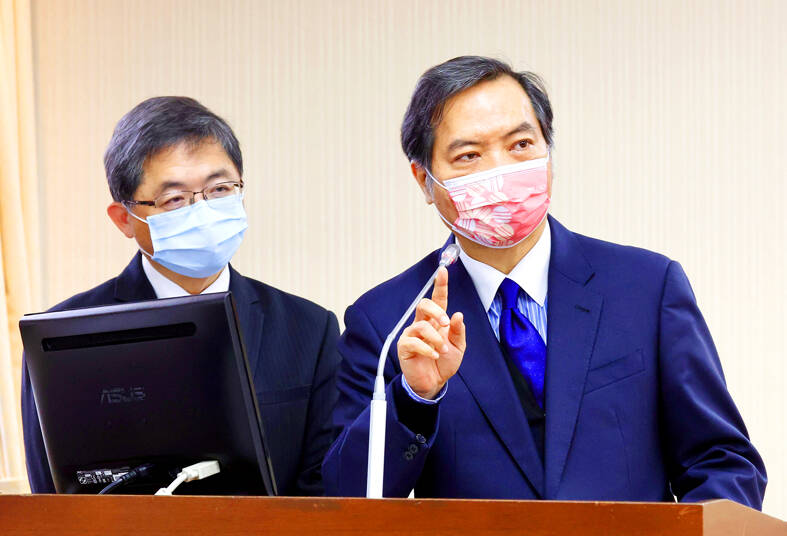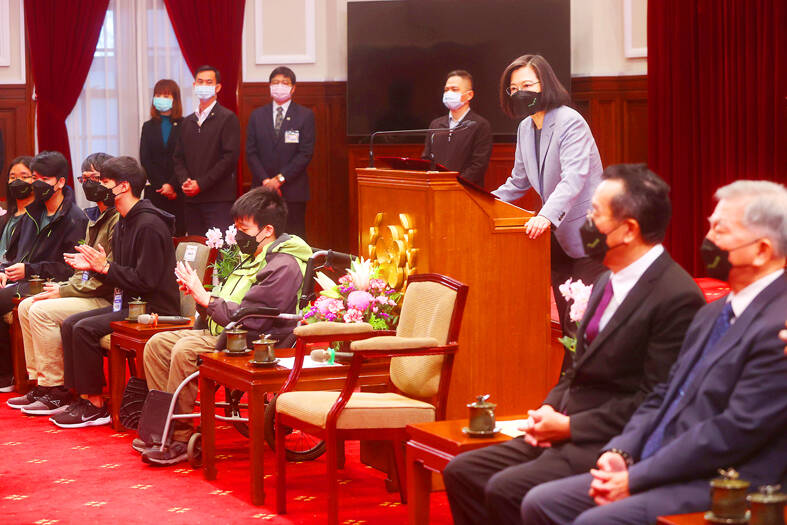Government employees could face punishment if they use TikTok and other Chinese streaming services that have the potential to compromise the nation’s cybersecurity systems, Executive Yuan officials said yesterday.
Although the Ministry of Digital Affairs last week announced that government workers may not download TikTok (or Douyin in Chinese), Xiaohongshu (小紅書) or other Chinese applications that could compromise cybersecurity, so far, only the Executive Yuan and its agencies have implemented the rule, Democratic Progressive Party (DPP) Legislator Loh Meei-ling (羅美玲) said at a meeting of the legislature’s Internal Administration Committee.
Government employees in the Legislative Yuan, the Judicial Yuan, the Control Yuan and the Examination Yuan can still access TikTok, she said, asking if the country had two different standards.

Photo: Reuters
Nor is there a list of software that government employees are prohibited to download to smartphones entrusted to them for government affairs, she said, adding that their smartphones are only subject to inspection twice a year.
Executive Yuan Secretary-General Li Meng-yen (李孟諺) said the Cabinet would coordinate with the four other government branches to uniformly ban the use of TikTok and other cybersecurity-compromising streaming platforms.
Minister Without Portfolio and Executive Yuan spokesman Lo Ping-cheng (羅秉成) said that government employees would be punished in accordance with the regulations if they contravene the TikTok ban.

Photo: CNA
“The punishment might not be enough to deter government workers from using TikTok, so we might need more effective solutions, such as preventing access to such software in public areas. These would be the types of issues that an ad-hoc task force of the Executive Yuan will address,” Lo said.
However, more public discussion is needed to determine whether Taiwan should draft laws to completely ban the use of TikTok across the nation, as India and other countries have done, Lo said.
Li said that the government has the responsibility to ensure that government agencies are free from the influence of Chinese apps.

Photo: CNA
“However, if the TikTok ban were to be extended from government employees to civilians, freedom of speech — which the government is obligated to protect — would be an issue,” he said.
Separately, President Tsai Ing-wen (蔡英文) said the government would reinforce the national cybersecurity infrastructure and enhance citizens’ ability to identify misinformation and disinformation to fight cognitive warfare launched by foreign forces.
Tsai made the remarks at the Presidential Office during a meeting with a group of students from the Kaohsiung Municipal Senior High School who won the top prize at this year’s Cybersecurity Golden Shield Awards.
“My administration has always believed that cybersecurity issues are national security issues. With the rapid development of new technologies, our cybersecurity system is facing increasing threats and frequent attacks. Foreign forces are launching cognitive warfare by disseminating misinformation and disinformation to confuse the public,” Tsai said.
“All these tactics could potentially do great harm to our democratic system. As such, we are enhancing citizens’ ability to identify misinformation and disinformation and reinforce the national cybersecurity infrastructure,” she added.
The Cyber Security Management Act (資通安全管理法), which the legislature passed in 2018, requires government agencies and key infrastructure operators to establish cybersecurity protection mechanisms.
“The Administration for Cybersecurity at the Ministry of Digital Affairs, which was founded in August, handles national cybersecurity issues, conducts cybersecurity protection drills and trains cybersecurity workers,” Tsai said. “We will also work with our democratic allies to build a more resilient and safer supply chain, and enforce measures to protect intellectual property rights.”

‘ABUSE OF POWER’: Lee Chun-yi allegedly used a Control Yuan vehicle to transport his dog to a pet grooming salon and take his wife to restaurants, media reports said Control Yuan Secretary-General Lee Chun-yi (李俊俋) resigned on Sunday night, admitting that he had misused a government vehicle, as reported by the media. Control Yuan Vice President Lee Hung-chun (李鴻鈞) yesterday apologized to the public over the issue. The watchdog body would follow up on similar accusations made by the Chinese Nationalist Party (KMT) and would investigate the alleged misuse of government vehicles by three other Control Yuan members: Su Li-chiung (蘇麗瓊), Lin Yu-jung (林郁容) and Wang Jung-chang (王榮璋), Lee Hung-chun said. Lee Chun-yi in a statement apologized for using a Control Yuan vehicle to transport his dog to a

Taiwan yesterday denied Chinese allegations that its military was behind a cyberattack on a technology company in Guangzhou, after city authorities issued warrants for 20 suspects. The Guangzhou Municipal Public Security Bureau earlier yesterday issued warrants for 20 people it identified as members of the Information, Communications and Electronic Force Command (ICEFCOM). The bureau alleged they were behind a May 20 cyberattack targeting the backend system of a self-service facility at the company. “ICEFCOM, under Taiwan’s ruling Democratic Progressive Party, directed the illegal attack,” the warrant says. The bureau placed a bounty of 10,000 yuan (US$1,392) on each of the 20 people named in

The High Court yesterday found a New Taipei City woman guilty of charges related to helping Beijing secure surrender agreements from military service members. Lee Huei-hsin (李慧馨) was sentenced to six years and eight months in prison for breaching the National Security Act (國家安全法), making illegal compacts with government employees and bribery, the court said. The verdict is final. Lee, the manager of a temple in the city’s Lujhou District (蘆洲), was accused of arranging for eight service members to make surrender pledges to the Chinese People’s Liberation Army in exchange for money, the court said. The pledges, which required them to provide identification

INDO-PACIFIC REGION: Royal Navy ships exercise the right of freedom of navigation, including in the Taiwan Strait and South China Sea, the UK’s Tony Radakin told a summit Freedom of navigation in the Indo-Pacific region is as important as it is in the English Channel, British Chief of the Defence Staff Admiral Tony Radakin said at a summit in Singapore on Saturday. The remark came as the British Royal Navy’s flagship aircraft carrier, the HMS Prince of Wales, is on an eight-month deployment to the Indo-Pacific region as head of an international carrier strike group. “Upholding the UN Convention on the Law of the Sea, and with it, the principles of the freedom of navigation, in this part of the world matters to us just as it matters in the